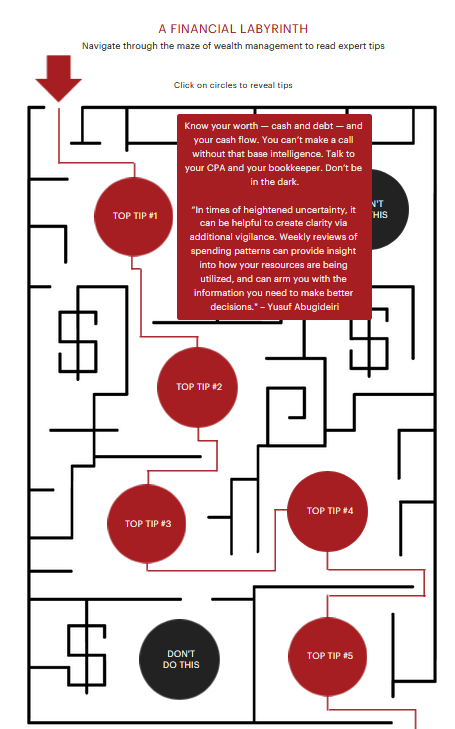Financial Experts Discuss Tips for Navigating Through Uncertain Times
September 03, 2020
YeskeBuie in the Media

The vulnerability we’re all experiencing in these uncertain times combined with an increase in free time has many people wondering, what should I be doing with my money? Two of our team members, Elissa and Yusuf, recently shared their thoughts on this question with Carolyn Proctor, Data Editor with the Washington Business Journal. We share their tips and answers as featured in the WBJ article, Financial Experts Discuss Tips for Navigating Through Uncertain Times.
- What’s your number one tip for individuals when it comes to managing their personal finances during an economic downturn like this?
-
- Yusuf: In times of heightened uncertainty, it can be helpful to create clarity via additional vigilance. Weekly reviews of spending patterns can provide insight into how your resources are being utilized, and can arm you with the information you need to make better decisions.
- Elissa: The planning for a downturn ideally happens before the downturn takes place. Having reserves is key during a difficult economic time. If prior planning wasn’t done, it can make sense to generate reserves even when the downturn has happened. If you have stocks, bond funds or company stocks that have not declined significantly, that is a good place to turn. If you have equity in a home, a home equity line of credit or reverse mortgage can be a good emergency fallback if ever needed. Also, look into the loan provisions on your retirement plan. This may be a last resort, but it can be a good alternative if you end up needing funds.
- What is one thing most people don’t usually think about, but should, to improve their financial situation during a recession?
- Elissa: Items we refer to as Financial Hygiene are important at all times, including and especially during a recession; keep adequate cash reserves; maintain your health insurance; check your other insurance (property and casualty, life, disability, etc.) to ensure adequate coverage. It may seem like a strange time to think about spending more money on anything, but if something happens during a downturn, it can be even more difficult to recover than otherwise.
- And what’s something too many people do during times like these that will actually hurt more than help them financially?
- Elissa: The worst thing someone can do in a downturn is to move out of the stock market with funds that are not going to be needed in the near future. Additionally, not adjusting expenses soon enough, which can often lead to credit card bills or emergency funds being used, is a common mistake and can cause financial harm. It’s easy to not notice things like that if you are not specifically focusing on them. Lastly, don’t forget that it’s important to take care of yourself first. Just because a family member is in need does not mean that you need to put yourself in a precarious financial situation in order to help them. You can be an empathetic ear to them. But you need to make sure you can pay your own bills first and foremost.
*Image Source: Washington Business Journal


